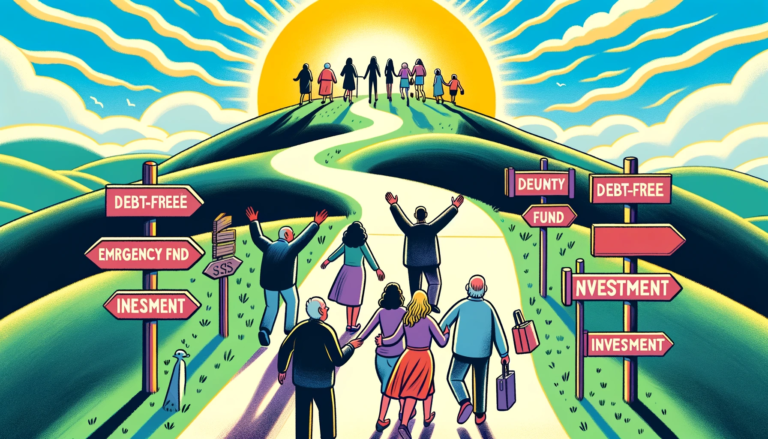The first step towards financial freedom is a personal one. It requires you to define what financial independence means to you. This definition varies for each individual; for some, it might be the ability to travel the world, for others, living debt-free, or perhaps retiring early. The key is to set specific, tangible goals. Visualize the lifestyle these goals will enable – whether it’s indulging in global travels, enjoying quality family time, or pursuing long-held hobbies. This vision will not only guide your financial decisions but also keep you motivated.
1. Defining your Financial Independence
The first step towards financial freedom is a personal one. It requires you to define what financial independence means to you. This definition varies for each individual; for some, it might be the ability to travel the world, for others, living debt-free, or perhaps retiring early. The key is to set specific, tangible goals. Visualize the lifestyle these goals will enable – whether it’s indulging in global travels, enjoying quality family time, or pursuing long-held hobbies. This vision will not only guide your financial decisions but also keep you motivated.
“Financial independence is about having more choices.” – Robert Kiyosaki
2. Assessing Your Current Financial Situation
A clear understanding of where you currently stand financially is crucial. This step involves a thorough assessment of your income, expenses, debts, and savings. Employing budgeting tools can be incredibly helpful in tracking and categorizing your spending. This exercise is not just about numbers; it’s about gaining insights into your spending habits and identifying areas where you can cut back, such as recurring subscriptions or frequent dining out. This honest financial self-assessment is the foundation upon which you can build a robust financial plan.
3. Shifting From Time-for-Money to Value Creation
The traditional model of trading time for money has its limitations. To transcend these limits, it’s essential to shift your focus to creating value. This could mean monetizing a skill or talent you possess, such as graphic design, coding, or writing. Consider freelancing, consulting, or even creating digital products like eBooks or online courses. The goal here is to generate income based on the value you provide, not just the hours you put in. This shift not only has the potential to increase your income but also offers greater flexibility and fulfillment.
4. Adopting a Frugal Lifestyle
Frugality is often misunderstood. It’s not about depriving yourself but making smarter spending choices. It’s about prioritizing spending on essentials and things that genuinely add value to your life. Embracing a frugal lifestyle might involve using budgeting tools to set spending limits, opting for DIY solutions, or simply learning to differentiate between wants and needs. This approach to spending is not about living a lesser life; it’s about living a smarter one.
“It’s not your salary that makes you rich, it’s your spending habits.” – Charles A. Jaffe
5. Building and Managing Your Emergency Fund
An emergency fund is a critical component of financial security. Aim to save at least three to six months’ worth of living expenses. This fund acts as a financial buffer against unexpected life events, ensuring that such surprises don’t derail your financial plan. Start small if necessary, and gradually increase your savings rate. This fund should be easily accessible, yet separate from your regular accounts to avoid the temptation of unnecessary spending.
6. Tackling Your Debts Strategically
Debt can be a significant obstacle on the road to financial freedom. A strategic approach to debt involves prioritizing high-interest debts, such as credit cards, and then methodically working through lower-interest debts like student loans or mortgages. Avoid accumulating new debts, especially for non-essential purchases. Remember, every dollar you free from debt repayment is a dollar that can be channeled towards your financial goals.
7. Investing in Yourself
Investing in yourself is perhaps the most profitable investment you can make. This encompasses both personal and professional growth. Enhance your skills and knowledge through continuous learning – this could be through online courses, workshops, or conferences. Don’t overlook the importance of maintaining good health; after all, your physical and mental well-being are foundational to your ability to earn and enjoy wealth.
8. Saving and Investing Wisely
Saving is the first step; investing is what amplifies your wealth. Begin by saving regularly, no matter how small the amount may seem. Once you’ve built a substantial emergency fund, turn your attention to investing. Diversify your investments across different asset classes like stocks, bonds, and real estate. Educate yourself about different investment strategies and stay abreast of market trends. Remember, the goal of investing is not just to save money but to grow it.
“The best investment you can make is in yourself.” – Warren Buffett
9. Simplifying and Automating Your Finances
In our complex financial world, simplicity and automation can bring clarity and efficiency. Consolidate your accounts where possible, automate bill payments, savings, and investments. This not only saves time but also reduces the likelihood of missed payments or unmanaged expenses. Regularly review and adjust these settings to ensure they align with your evolving financial goals.
10. Continuously Reviewing and Adjusting Your Plan
The journey to financial freedom is not a straight line; it’s a path that requires regular reassessment and adjustment. Schedule monthly or quarterly check-ins to review your financial progress. Be prepared to adjust your budget, savings rate, or investments as your life circumstances change. Celebrate your milestones – they are reminders of how far you’ve come and motivators for the journey ahead.
Conclusion
Financial freedom is a journey that intertwines the practical with the aspirational. It’s a path paved with discipline, smart decision-making, and a commitment to continuous growth. By following these steps and adapting them to your unique circumstances, you can build a financially secure and fulfilling life. Remember, the path to financial freedom is as unique as you are, so tailor these steps to suit your personal aspirations and circumstances.




